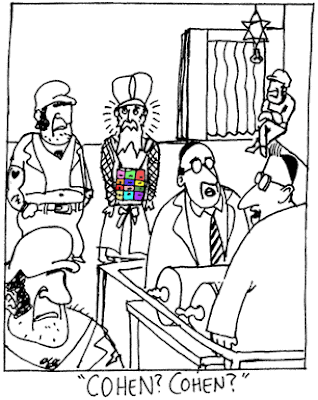The Golden Calf You and I Construct
By: Rabbi YY Jacobson
Wisdom of a Child
A child sees the bulletin of the Synagogue announcing that the congregation had just hired a new rabbi, his name is Rabbi Dr. Epstein. The child is so excited that the new rabbi is also a doctor, that the next time he has a stomach ache, he calls the Synagogue.
"I would like to speak to the Rabbi Dr.," the boy says. The rabbi gets on the line and asks how he can be of help. "Well rabbi, the boy says, I have a stomach ache and I was wondering what you suggest I do."
"Sorry son, I'm not a medical doctor," replies the rabbi.
"What type of doctor are you?" asks the boy. "I am a Dr. of Philosophy," was the response.
The child thought for a moment and then asked, "What type of sickness is that?"
What's the Big Deal?
It is difficult for us to relate to the boundless passion that inspired the Jewish people to create and worship a calf of gold, merely 40 days after they stood at Mt. Sinai and heard the Divine decree of (1) "You shall have no other gods before me." After all, are there any among us who would find delight in dancing around a molten calf and declaring, "This is Your G-d, O Israel? (2)."
Yet, even a superficial reading of this week's Torah portion, Ki Sisa, in which the story of the golden calf is related, indicates the cataclysmic effect of this seemingly meaningless event on the eternal destiny of the Jewish people (3). Why did the creation of a foolish idol by a group of Jews in the Sinai desert become one of the most central episodes in the history of the Jewish people?
Abraham's Search
In Maimonides' laws on idolatry, where he describes the first Jew's quest for truth and his recognition of Monotheism, we read that initially, Abraham was "immersed amongst the foolish idol worshippers of Ur Kasdim [a city in Mesopotamia]; his father, mother and the entire population—he amongst them—all worshipped idols (4)."
Asks Rabbi Schneur Zalman of Liadi (5): Why did Maimonides find it important to emphasize in his book of Jewish law (not Jewish history) that the first Jew was steeped in idol worship (6)?
The Soul of Idol Worship
By failing to understand the underpinning virtues of idol worship we are unintentionally engaging in just that: idol worship. Let me explain:
What is the essence of idol worship? Nothing more than a person in need of a power in his life, attributing that power to a particular object or person and thus surrendering his or her self to that object or person, worshipping it as a deity.
The problem of idol worship lies not in the yearning and need for a power that leads one to worship an idol; this yearning and need is, in fact, positive, even sacred. It is in accepting the notion that a worthless and lifeless object carries within it the fulfillment of one's yearning—that is what turns idol worship into a meaningless and often destructive pursuit.
This is why it is important that we know that the first Jew once passionately worshipped idols. Had this young man been indifferent to the idols of his native land, he never would have searched for and discovered the true G-d. Since Abraham yearned for truth and craved intimacy with G-d, he passionately devoted himself to worship the idols of his father's home in the erroneous belief that they embodied the ultimate truth of the cosmos.
In other words, underlying Abraham's fiery idol worship was a soul yearning for the one living G-d. Thus, when he matured, he discovered that his sacred craving needed to be redirected toward the true G-d and not to the false substitutes for G-d.
The Soul of an Impulse
We all experience in our daily lives various impulses and urges directed toward certain people or particular things.
Are you infatuated with a particular person? Are you starving for attention, compliments and approval? Do you crave nicotine, alcohol or weed? Are you obsessed with an unceasing urge for physical intimacy? Are you in love with food? Do you enjoy dominating and controlling other people's lives?
Judaism teaches (7) that these impulses and many others are not necessarily negative or destructive in and of themselves. In fact, all of these cravings may be expressing the purest and most spiritual needs of the soul. At the core of a crush on another human being or an obsession with intimacy, food or attention, may be the longing of one's soul for a sense of inner worth and dignity, for companionship, vulnerability and self fulfillment.
Our psyches, however, distort our clarity and attribute false symbolism to these essentially hollow pursuits. As a result of this distortion we—just like the Jews in the desert—devote our time and passion to carefully construct and worship our personal "golden calves" in the mistaken belief that they will fill the void in our heart and nourish the hunger of our souls.
Behind many an addiction there is a profound yearning to receive or give love. But our minds are often so bruised and wounded that the outlet we target with our addiction to achieve that love is an “idol,” a futile target which will only distance us from the true love we are searching for.
The Torah's war against the creation of the golden calf is central to our mission in life. It symbolizes our daily relentless effort of turning our attention from the false carriers of value to the true carriers of value.
















